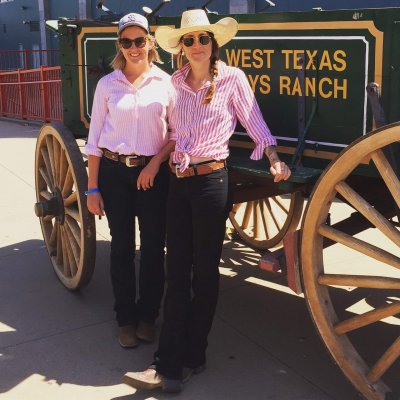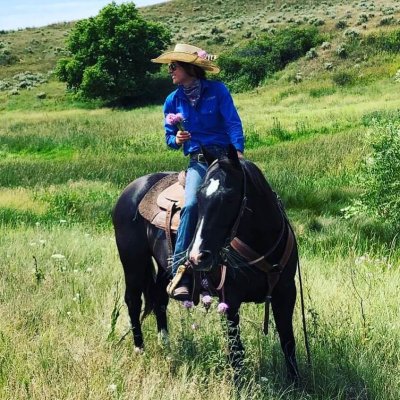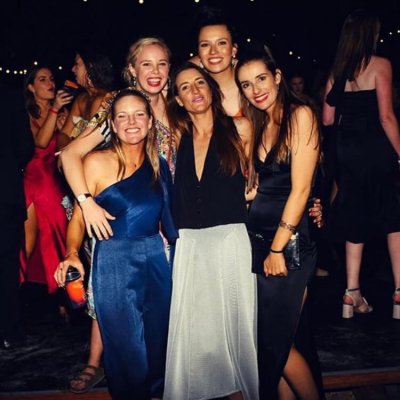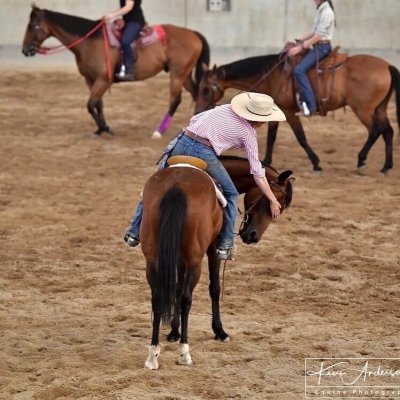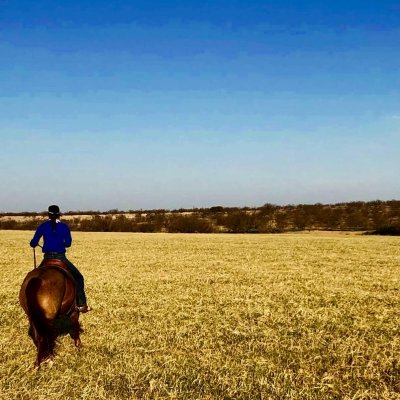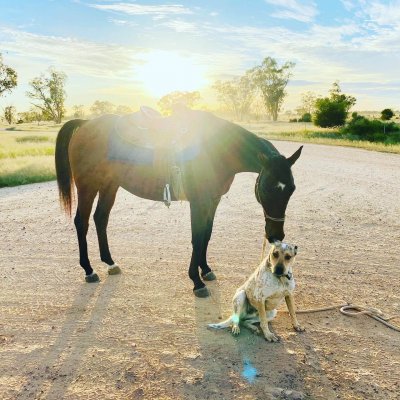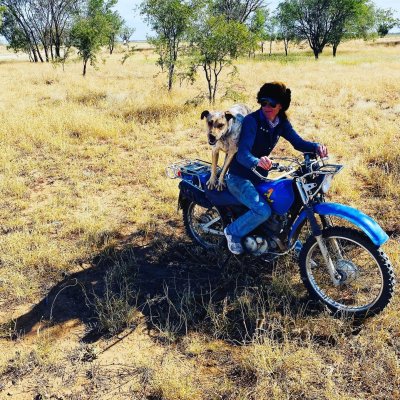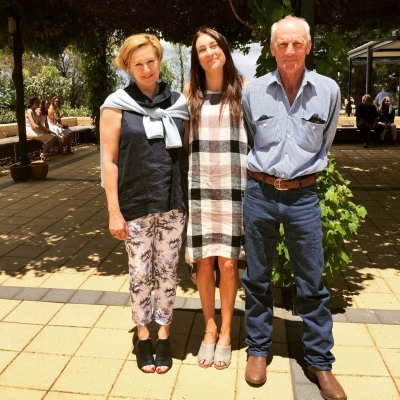This Texas star burns big and bright, no matter where she is or what latest rural enterprise she’s turning her hand to. There’s no stopping her, and that’s the way it’s always been. With an upbringing moving from property to property with her station-managing parents and sisters, Lucy barely stayed in the same town for longer than a year, and she’s had itchy,globe-trotting feet ever since. Now with her career hitting top gear, this rural trailblazer has a professional network spanning the globe. Her greatest achievement? Starting a business with her biggest fan – her Dad, Shane. Inspired by an annual working trip to the US, Morrissey & Friends Livestock Services is now a thriving consultancy ‘facilitating practical and progressive training and consultation in stockmanship, horsemanship and team development.’ Or, as their slogan so beautifully nails it: We work with horses, cattle and people. Creating mutual respect and understanding between the animal and the handler through understanding animal behaviour.
In Lucy, health and safety has a new voice. It’s not that same-old same-old “it’s the nature of the beast” BS, band-aid solutions or paperwork for paperwork’s sake – her focus is life-changing, preventative steps with real insight. When asked what concerned her about the health, safety and wellbeing of those in rural industries and communities, Lucy laid her cards on the table, saying that the age-old adage of “She’ll be right” has well and truly had its day, and that the real, ongoing challenge to improving health and safety starts at home. “Make sure your partner, family and team members know how much you want them there and how valuable they are. A little motivation goes a long way.” She also reinforced the need to be deliberate about equipping people with the right skills to work safely, efficiently and to enjoy themselves in the process.
How would you describe yourself in three words?
Kind, courageous and authentic.
Tell us something interesting about yourself...
I’ve always moved around a lot, my parents managed cattle stations when my sisters and I were young which encompassed shifting from station to station. I guess this privileged childhood is the reason I grew up with itchy feet syndrome.
I haven’t lived the same house, let alone the same town or even region for more than 12 months since high school. I’ve travelled to different countries all over the world, mostly just to experience all that life offers but also in more recent years to develop my professional network. I love the gypsy style of life, the freedom to be able to pack my gear into the ute with animals in tow, and driveto wherever the next adventure may be. Usually it’s based around work, but I’ll happily choose a job that’s on offer due to the added bonus of a new and exciting location. If I were to attempt and count the number of jobs I’ve had in my time, I’d have trouble –but what I can confirm is that I have only ever worked 2 full financial years with the same employer in my time. I’m a Human Recourse Managers nightmare, but I’m proud of my experiences and they have enabled me to become a well-rounded professional with a broad skill set. I have established a huge network of friends professionally and personally and have developed an appreciation for a great workplace culture when I see one. In saying that, I’m not everyone’s cup of tea and have certainly upset a few people along the way, but in the words of Winston Churchill “You have enemies? Good, that means you’ve stood up for something, sometime in your life”.
There’s nothing particularly interesting about me per se, however I certainly wouldn’t consider myself positioned in the middle of the bell curve…
What achievements are you most proud of?
Starting a business with my father, Morrissey & Friends Livestock Services. This business was a concept that my father Shane and I had been throwing around for a couple of years. In 2018, upon returning from my annual trip to the States (where I work with friends in the veterinarian / livestock / animal handling / consultancy areas), Shane and I decided it was time to bite the bullet. There’s never a good time to take the leap into the unknown of starting your own business, especially when there isn’t really anyone else in the country providing a service similar to what we offer; as there’s no-one to provide advice or make suggestions. It’s just stitch your heart to your sleeve real tight and hold your head high. Shane and I firmly believe in what we do and we are lucky to have very supportive friends, family and a fabulous network of industry professionals by our sides, so really all we need to do is be resilient and work hard.
Morrissey & Friends Livestock Services facilitates practical and progressive training and consultation in stockmanship, horsemanship and team development. Within that we have specific focal points on animal welfare and occupational health and safety. Ultimately the training and consultation we offer works by creating a mutual respect and understanding between the animal and the handler by introducing an understanding of animal behaviour. This working relationship improves life for the animal through the reduction of stress, and also reduces significant risk for the handler. The safety aspect of our business is the reason that Alex from #PlantASeedForSafety and I connected, to which I hope will develop into a promising professional relationship.
What makes you truly happy?
I try to practice being conscious in every moment of life and be appreciative of what’s right in front of my face; a cloud formation or sunset, my goofy dog doing laps of the house in sheer, uncontrollable joy, the comical mood swings of my chestnut mare (hell hath no fury!), the fluorescent lines of glowing green wheat sprouting in the paddocks on the daily drive. Too often I get caught up in my head being ‘busy’ and forget to enjoy the simple things in life. Being able to share and bring understanding to the simplistic importance of these moments with my friends and family from Southern Victoria is something that brings feelings of contentment and a true smile to my face. It’s a long way for them to travel to visit, and it doesn’t happen often, but when it does you can see me glowing from nations afar.
What do you love the most about being a rural woman?
I’m fortunate to be able to enjoy the best of both worlds, city and coastal living with friends and family, and my home life and professional life in a rural setting. I can choose whoever I want to be on any given day and its easy for me to live and enjoy both lives. My heart will always be in rural Queensland but I will never tell my southern friends to stop asking me “When are you coming home?!”. I love how authentic rural people are and rural living is, I love the realness of the lifestyle and the ‘can’t say I’ve ever seen that before’ moments.
Tell us about a time when you felt worried about your own or someone else’s health, safety or wellbeing.
My experience working in intensive livestock production has shown me that regardless of the person or the scenario, anything that can go wrong, will go wrong, and it will always happen once. Intensive production is a fast-paced working environment with slim margins and requires infinite attention to detail. What worries me most in regard to health and safety is that incidents are often considered ‘the nature of the beast’, and are somewhat expected as collateral damage due to the long hours in tough conditions and the fact that people work with rather large animals that have four legs, a heartbeat and a brain, on a daily basis, and often in confinement. It’s high risk. Fact. However, my concerns here lie specifically in how industry chooses to ‘fix’ problems as they arise e.g. applying ‘band aid treatment’ or ‘updating procedures and ticking the boxes’, rather than focusing on preventative methods. And no, I’m not talking about hi-vis shirts and helmets, cattle are mostly colour blind so it makes no difference to them what colour handlers wear!
There are many situations that I have been involved in and situations that I have witnessed that are terrifying, but I think the bigger issue is the need to focus on preventative methods such as valuable, consistent and ongoing training of handlers which provides them with the skillset to work efficiently, safely and enjoy their job every day. Appropriate knowledge sharing and support networks can reduce hours worked and employee exhaustion, and understanding animal behaviour allows for safer handling and progression in skill set – all leading to job satisfaction – which often correlates with a reduction in workplace incidents and staff turnover.
What practical things did - or could - you or someone else do to prevent yourself or someone else from getting hurt?
I recently read a post suggesting that people who have lost their jobs and are unable to work should seek out ‘unskilled’ agricultural employment in rural areas for a few months until the pandemic cools down. This is fabulous, and sure – the more the merrier, anyone is welcome in the agricultural industry and the majority of people are capable of fulfilling the requirements of many roles – HOWEVER, the ‘unskilled’ comment got my feathers ruffled. You DO need skills in this industry and if you don’t have them you need to be taught, supported, mentored and SUPERVISED by experienced team members. Induction programs are so incredibly important and are often understated or rushed. Supervision is integral to supporting the learning of new skills, promotion of professional growth and the prevention of accidents. To me, induction programs, ongoing training and supervision are practical examples of how to significantly reduce the risk of accidents and injuries in the agricultural industry.
“You need skills in this industry, and if you don’t have them you need to be taught, supported, mentored and supervised by experienced team members.”
Lucy Morrissey, Texas, Queensland AU Tweet this
Is there a time, place or scenario when your partner or those you work or spend time with are more willing to make changes to the way the work is done, or are more open to making safer, healthier choices?
There’s no time like the present and it’s never too late to adopt changes to the work environment. Team meetings that introduce a topic and discuss the most practical ways to initiate implementation are a good start.
It’s important that everyone can contribute and have their ideas heard, that way they take ownership ofthe change. It won’t happen overnight (though some things can), but with consistency, focus and a goal in mind that can potentially be rewarded in some way, the desired effect will come to fruition without scaring too many people by using the word change!
If you could give any advice to another rural woman about health, safety and/or wellbeing in rural industries and communities, about influencing change in business - or just in general - what would it be?
Make sure your partner / family / team members are aware of how much you want them there and how valuable they are. A little motivation goes a long way. However, be sure that they understand that they are no good to you or anyone else when they are tired, unhappy, unfocused or injured. It’s important that they remain self-aware and know when then need a break, or some help; it takes courage to be honest about weakness. There’s a reason work hours are regulated with specific rest time and frequent days off. That’s what we are all entitled to, and it’s what the body needs to function at its optimal level to stay safe, happy and efficient in everyday life. The ‘I’ll be right’ mentality gets us through the day in the short term, but not very far in the long term. What goes up must always come down!
Is there anything else you'd like to share?
Be HONEST with yourself and others.
Always maintain your INTEGRITY.
Show RESPECT to yourself, people, animals and the environment.
BE KIND!
